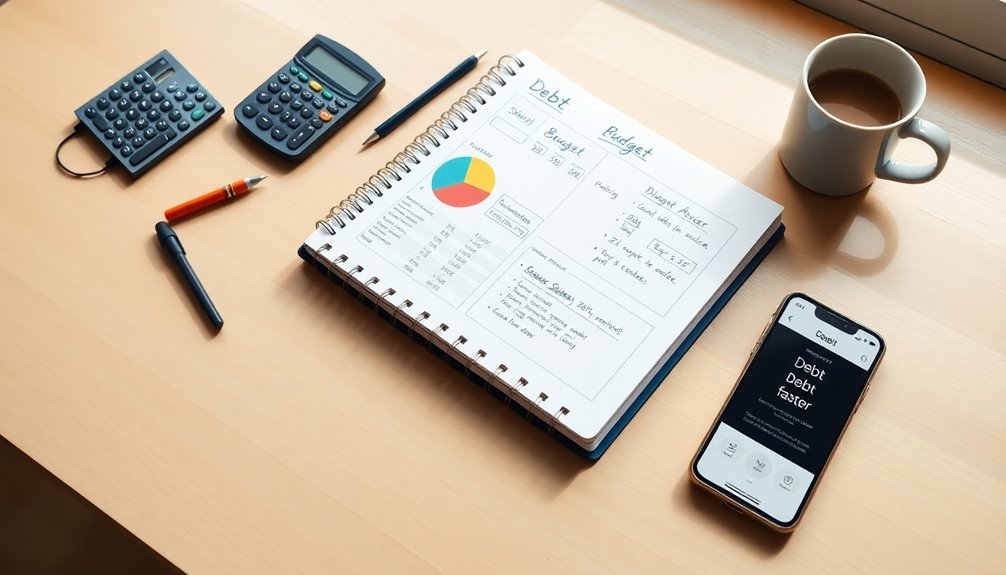To pay off debt faster, start by evaluating your finances, creating a realistic budget, and tracking your spending. Focus on paying off high-interest debts first and make extra payments whenever possible. Consider consolidating debts or negotiating lower rates, and automate your payments to stay consistent. Boost your income through side gigs or negotiating raises. Keep an eye on your progress and adjust strategies as needed—there’s more you can do to speed things up.
Key Takeaways
- Prioritize debts by interest rate and use the avalanche method to minimize interest costs.
- Create a realistic budget, track expenses, and adjust regularly to free up funds for debt repayment.
- Increase income through side hustles, negotiations, or passive streams, then redirect extra funds to debts.
- Consider debt consolidation options to simplify payments and potentially lower interest rates.
- Continuously review progress, celebrate milestones, and adjust strategies to stay motivated and on track.
Assess Your Debt and Create a Budget

Have you ever wondered where your money is really going each month? The first step to paying off debt faster is performing a financial assessment. Take a close look at your income, expenses, and existing debts. This helps you understand your financial situation clearly. Once you know where your money is going, start budget planning. Create a realistic budget that covers essentials while allocating extra funds toward debt repayment. Track your spending to stay accountable and identify areas to cut back. Remember, a thorough financial assessment combined with effective budget planning sets the foundation for a solid debt repayment strategy. By understanding your finances, you’ll be better equipped to make informed decisions and accelerate your journey toward financial freedom. Additionally, understanding the tax implications of different investment options can help you make more informed financial decisions. Incorporating expense tracking tools can further streamline your budgeting process and ensure you stay on track with your debt repayment goals. Regularly reviewing your spending habits can also reveal opportunities to optimize your financial plan and stay motivated throughout your debt payoff journey. Exploring sound financial practices, such as automating payments, can also help maintain consistency and reduce the likelihood of missed deadlines. Using financial analysis to evaluate your progress can provide valuable insights that keep you motivated and on course.
Prioritize High-Interest Debts First

Focusing on high-interest debts first is a smart way to reduce the total amount you pay over time. This approach, known as interest prioritization, helps you save money by tackling the most expensive debts first. The debt avalanche method is especially effective because it minimizes the interest accrued, allowing you to pay off debts faster.
Consider these key points:
- List your debts by interest rate, starting with the highest.
- Allocate extra payments to high-interest balances first.
- Once a high-interest debt is paid off, redirect those funds to the next in line.
Prioritizing high-interest debts ensures you cut down the overall debt faster and reduces the burden of accumulating interest over time.
Make Extra Payments Whenever Possible

Making extra payments whenever you can is one of the most effective ways to accelerate your debt payoff journey. By incorporating extra payments into your budget planning, you reduce your principal faster, saving you money on interest. If you’re using the debt snowball method, paying extra on smaller debts can give you quick wins and momentum. Even small additional payments add up over time, shortening your repayment period. Review your monthly expenses to identify areas where you can cut back and redirect those funds toward debt repayment. Consistently making extra payments not only speeds up your progress but also boosts your motivation. Staying disciplined and committed to your repayment plan reinforces the importance of personal goal tracking in maintaining momentum. Incorporating knowledge about financial planning strategies can further enhance your repayment efforts. Exploring hackathons, such as virtual or internal company events, can also provide innovative ideas to improve your financial management and savings strategies. Additionally, practicing mindfulness during your financial planning can help you stay focused and committed to your debt reduction goals. Understanding the importance of debt repayment methods can help you choose the right approach for your situation.
Consider Debt Consolidation Options

Debt consolidation can be a smart way to simplify your repayment process and potentially lower your interest rates. By combining multiple debts into a single loan or payment plan, you make debt management more manageable. It can also reduce your overall interest costs, helping you pay off your debt faster. Before deciding, consider options like a personal loan, balance transfer credit card, or a home equity loan. You might also seek credit counseling to explore consolidation strategies tailored to your situation. Keep in mind that consolidating isn’t a quick fix; it requires discipline and a solid repayment plan. Here are some benefits:
- Simplifies debt management by consolidating multiple payments
- Can lower interest rates, saving money
- May improve your credit score over time
Additionally, understanding debt repayment strategies can help you choose the most effective approach to becoming debt-free sooner. Incorporating budgeting techniques can further enhance your ability to stay on track with your repayment plan and accelerate your progress. Staying informed about personal growth strategies can also motivate you to maintain your financial discipline and achieve long-term financial stability. Regularly reviewing your security measures ensures that your payment methods remain protected from evolving cybersecurity threats. Utilizing debt forgiveness bills when eligible can provide additional relief and expedite your debt payoff journey.
Automate Your Payments to Stay Consistent

Automatically scheduling your payments guarantees you never miss a due date, keeping your debt payoff on track. By setting up automatic transfers, you ensure your payments are made consistently without manual effort. This reduces the risk of late fees and damaging your credit score. Many banks and lenders offer payment reminders, alerting you before each due date for added peace of mind. You can customize these reminders to suit your schedule, helping you stay organized and motivated. Automating your payments takes the guesswork out of debt repayment, making it easier to stick to your plan. Plus, knowing your payments are handled automatically helps you focus on other financial goals. Incorporating automatic payment options can further streamline your debt payoff strategy and enhance your financial discipline. Additionally, automating payments aligns with financial technology trends that promote smarter money management, which often utilize secure online platforms to ensure safe transactions. Using payment automation tools can also reduce manual errors and improve your overall financial management efficiency.
Increase Your Income to Accelerate Payments

Boosting your income can speed up your debt payoff process considerably. Consider taking on side hustles, negotiating for a salary increase, or monetizing your skills to bring in extra cash. These strategies help you pay down debt faster and achieve financial freedom sooner. Additionally, exploring personal development opportunities can enhance your skills and open up higher-paying earning avenues. Understanding ethical hacking techniques can also empower you to identify financial vulnerabilities and protect your assets more effectively. Improving your financial literacy can further enable smarter decision-making and resource management, especially as the demand for hybrid bicycles continues to grow.
Explore Side Hustles
One of the most effective ways to speed up debt repayment is by exploring side hustles that can supplement your regular income. These extra income streams can make a real difference in paying off debts faster. Consider taking on freelance projects, which let you leverage your skills for pay. Participating in online surveys is another simple option; it requires minimal effort and provides quick earnings. You could also explore delivery gigs or tutoring, depending on your interests. The key is to find flexible opportunities that fit your schedule and skills. By dedicating a few hours weekly to side hustles, you’ll increase your income and accelerate your debt payoff timeline. Small, consistent efforts can lead to significant progress toward becoming debt-free faster. Additionally, increasing your overall income can help balance expenses related to raw food diets and other health-focused investments, further supporting your financial goals. Incorporating additional income sources can enhance your ability to stay committed and reach your financial milestones more efficiently. Engaging in side hustles that align with your skills and passions can also boost motivation and sustainability over the long term. Moreover, exploring market trends like self-serve options and seasonal promotions can help identify lucrative opportunities for extra earnings.
Negotiate Salary Raises
Negotiating a salary raise can considerably increase your income, helping you pay off debt faster. When you focus on salary negotiation, you improve your chances of career advancement and higher earnings. Preparation is key: research industry standards, gather evidence of your achievements, and choose the right moment to ask. Consider these factors:
| Timing | Approach | Confidence Level |
|---|---|---|
| Performance review | Highlight your contributions | Practice beforehand |
| Company growth | Demonstrate your value | Know your worth |
| Skill development | Show ongoing commitment | Be assertive |
Monetize Skills Effectively
Building on your efforts to increase income through salary negotiations, you can further accelerate debt repayment by monetizing your skills. Skill monetization involves leveraging your expertise to generate extra income, including passive income streams. This approach not only boosts your earnings but also diversifies your income sources, making debt payoff quicker. Consider these strategies:
- Offer freelance services in your field to create a steady cash flow
- Develop online courses or ebooks to earn passive income over time
- Rent out skills or equipment through sharing platforms for immediate cash
Negotiate Lower Interest Rates With Creditors

To successfully lower your interest rates, you need to understand your credit terms and what your creditors might be willing to negotiate. Prepare a strong pitch by highlighting your good payment history and commitment to paying off your debt. Being clear and confident can increase your chances of securing more favorable interest terms.
Understand Your Credit Terms
Understanding your credit terms is a essential step toward paying off debt faster. Knowing your loan terms and checking your credit report helps you identify opportunities to negotiate better rates. When you understand the specifics of your credit report, you can spot errors or outdated information that could be hurting your score. This knowledge empowers you to approach creditors with confidence.
- Review your credit report regularly to identify inaccuracies
- Understand the interest rates and repayment terms of each loan
- Use this information to negotiate lower interest rates or better terms
Prepare Negotiation Pitch
Are you prepared to negotiate lower interest rates with your creditors? Crafting a strong negotiation pitch can considerably reduce your debt faster. Before reaching out, consider options like debt settlement or credit counseling to strengthen your position. Visualize the process with this table:
| Step | Action | Outcome |
|---|---|---|
| 1 | Gather financial info | Know your debt details |
| 2 | Research interest rates | Benchmark your current rate |
| 3 | Prepare your pitch | Present a compelling case |
| 4 | Highlight hardship | Show willingness to pay |
| 5 | Negotiate terms | Aim for lower rates or payment plans |
A well-prepared pitch demonstrates your seriousness and increases the chances of securing favorable interest rates, ultimately speeding up your debt payoff.
Highlight Payment History
Have you ever considered how your payment history can strengthen your case when negotiating lower interest rates? Your consistent, on-time payments boost your credit score, showing creditors you’re reliable. When approaching them, emphasize your positive payment history to demonstrate responsibility. This can help you secure better terms and lower your interest rates. To effectively highlight this, consider:
- Providing proof of timely payments and account history
- Showing improvements in your credit score over time
- Explaining any past issues and how you’ve rectified them
Track Your Progress and Adjust Your Plan

Tracking your progress is essential to staying motivated and on course to pay off debt faster. Regularly monitoring your financial journey allows you to see how far you’ve come by tracking milestones, like paying off a specific debt or reaching a savings goal. This visibility keeps you motivated and helps identify areas where you can improve. If you notice certain debts are taking longer to pay off, don’t hesitate to adjust strategies—perhaps by increasing payments or reallocating funds. Staying flexible ensures you’re always working efficiently toward your goal. Regularly reviewing your plan keeps it aligned with your current financial situation, making your debt payoff process more effective and less overwhelming.
Frequently Asked Questions
How Long Will It Take to Pay off My Debt Using These Strategies?
The time it takes to pay off your debt depends on your repayment timeline and how interest accrual impacts your progress. If you stick to a solid plan, making extra payments when possible, you’ll shorten your repayment timeline. Keep in mind, high interest rates can slow you down, but staying consistent helps you reduce overall interest and reach debt freedom sooner. Tracking your progress regularly keeps you motivated and on course.
Are There Risks Associated With Debt Consolidation?
Imagine sailing through calm waters, but suddenly hitting hidden rocks—that’s like the risks involved with debt consolidation. Consolidation concerns include potentially higher interest rates, extended repayment periods, or fees that could outweigh benefits. You might also risk damaging your credit score if you miss payments. While it can streamline payments, you should weigh these risks involved carefully, ensuring consolidation truly aligns with your financial goals.
Can I Use These Strategies for Student Loans?
You can definitely use strategies like refinancing options for student loans, but be cautious. Refinancing might lower your interest rate and monthly payments, helping you pay off faster. Keep an eye on student loan forgiveness programs, which could impact your repayment plan. Before making changes, compare benefits and risks, and consider how refinancing could affect your eligibility for forgiveness. Always choose a strategy that aligns with your financial goals.
What Should I Do if I Can’t Meet My Payments?
When you can’t meet your payments, it’s like hitting a bump in the road; it happens. First, consider building an emergency fund to cover immediate needs. Reach out to a financial advisor for personalized guidance, and explore options like income-driven repayment plans or deferment. Taking these steps can ease the pressure and help you regain control, turning a tough moment into a manageable situation.
How Do I Stay Motivated During a Long Debt Payoff Journey?
Staying motivated during a long debt payoff journey can be tough, but celebrating milestones helps keep you encouraged. Set small goals and reward yourself for achieving them, which creates positive momentum. Use visual motivation like charts or progress trackers to see your progress clearly. Remember, each step brings you closer to financial freedom, so stay focused, stay proud of your progress, and keep visualizing the payoff to stay motivated.
Conclusion
By following these strategies, you’ll find yourself gently steering toward financial freedom. Remember, consistent effort and a bit of creativity can help you lighten your load over time. Don’t forget to review and adjust your plan as needed—sometimes, a small shift can make a big difference. Stay committed and patient; with steady progress, those debts will become a thing of the past before you know it.









